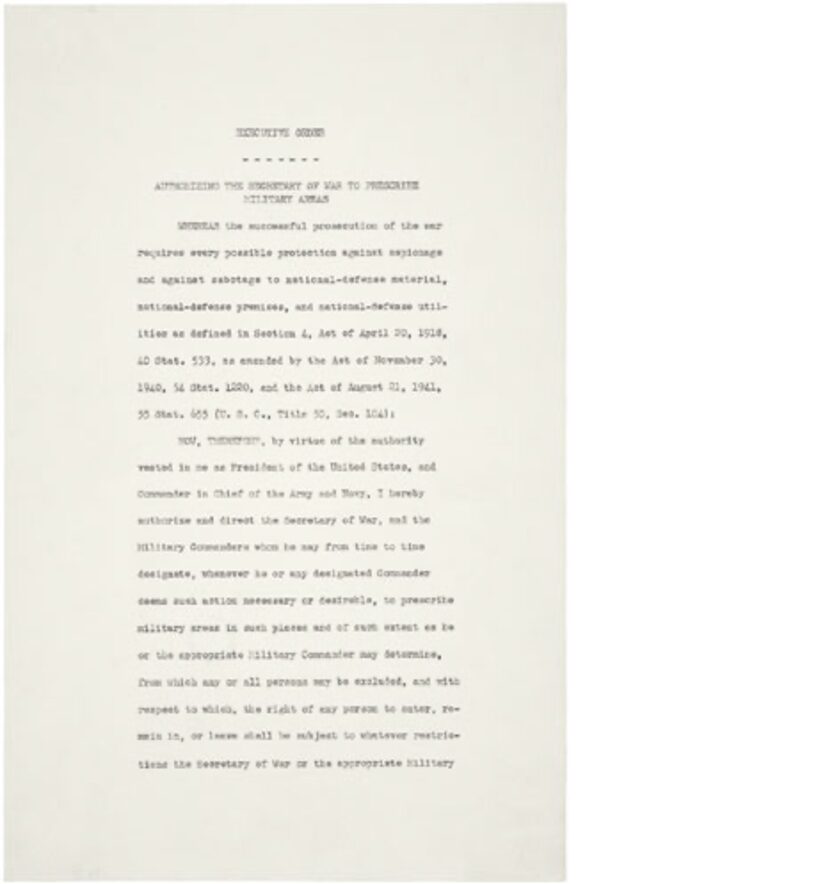I write this piece on February 19, 2023. February 19. The Day of Remembrance of Japanese American Incarceration during World War II. On February 19, 1942, about two months after the bombing of Pearl Harbor, President Franklin Roosevelt signed Executive Order 9066. The stated intention was “preventing espionage” by the forced removal of all persons deemed a “threat to national security” from the West Coast to “relocation centers” (aka internment camps, aka prisons) further inland. This resulted in the incarceration of over 120,000 Japanese Americans, US citizens, being forcibly removed from their homes, their livelihoods, their lives.
There is a lot that could be said about this. I could write about how few people were outraged. I could write about that even this was happening, more that 30,000 Japanese Americans served with distinction during World War II, in segregated units. I could write about how at least some of this was based in economics and nativism, since Japanese American farmers were so successful in California and elsewhere. I could write about how this is another example of the blatant racism that has been a consistent thread throughout our history. I also could write about how Japanese Americans attempted to challenge this in the courts. I could write about how there were others who dissented and spoke up as well, just like at other times of atrocity in our history, only to have the rich and powerful control the narrative and thus actions taken.
Instead, I want to briefly write about the generations of people who continue to carry trauma due to racism, colonization, and violence. I am by no means an expert on this, but this day makes me think about it.
I have a friend who is Cambodian. He is half my age, which means he is a generation younger. We both come from families that are survivors of genocide. In his case, survivors of the Khmer Rouge regime. In my case, survivors of the genocide in Germany as well as other Eastern European efforts to kill Jews. In both our cases we carry with us generational trauma, that is, we have inherited some aspects of trauma from our families. Different times, different traumas, trauma nonetheless.
Generational trauma can play out in lots of ways, such as hypervigilance, a sense of a shortened future, mistrust, aloofness, anxiety, depression, nightmares, insomnia, a sensitive fight or flight response, issues with self-esteem and self-confidence, and more. To be honest, I am not really interested in baring my issues in this format. Perhaps it is my hypervigilance and mistrust.
There is so much generational trauma that is carried by so many people(s) that I couldn’t possibly name it all. Generations of women who carry the traumas inflicted by patriarchal violence. Generations of Indigenous peoples, in the US and all over the world, who carry the traumas inflicted by genocidal colonization. People of African descent who carry the traumas inflicted by kidnapping, murder, enslavement, colonization, and so many other horrors. People of Irish descent who carry the traumas inflicted by colonization and starvation. Clearly, I could keep going on and on, but you get the point. And of course, there are many people who carry multiple traumas from various sources I have named and more.
Sometimes I wish we could unplug the human race and let ourselves reboot.
And I have hope. And while I do believe, to paraphrase Dr. King, the arc history is long and it bends toward justice, I also don’t believe it bends on its own. I know so many people who are bending it, who have found and continue to find ways to heal, to thrive, to work and play toward justice, and to share love. I am inspired by you all.
Again, I write this piece on February 19, 2023. February 19. The Day of Remembrance of Japanese American Incarceration during World War II. I think about my, about our Japanese American friends, colleagues, neighbors, family, who live with, who carry with them that trauma. My heart goes out to each and every one of you. May you continue to find, may we continue to collectively find ways to heal.
